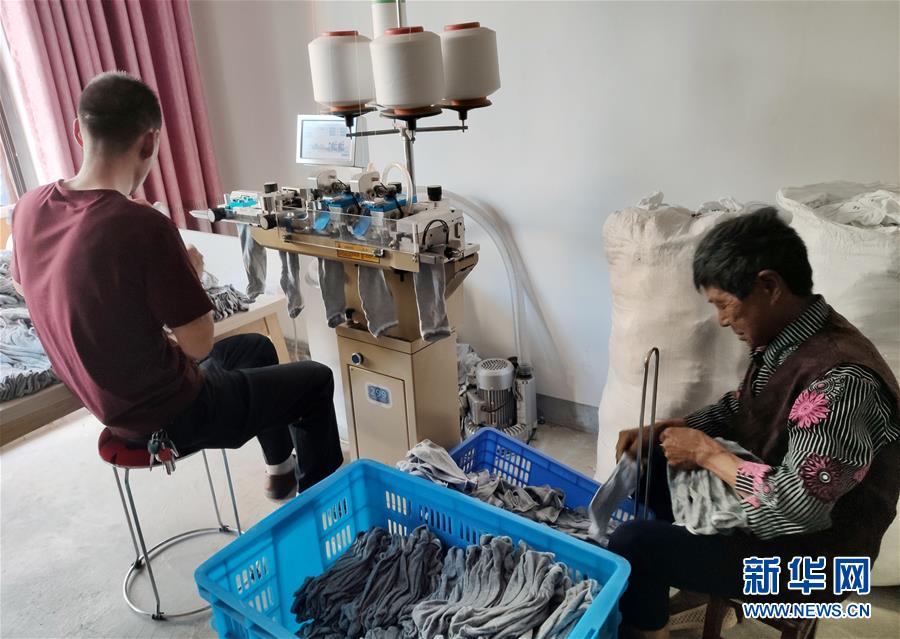Prosperity and green outcomes achieved at South-to-North Water Diversion Project site
p.china.org.cn by Jin Ling,September 18, 2020 Adjust font size:
Resettlement and business promotion helps Yunyang fight poverty
At 2:32 p.m. on Dec. 12, 2014, the Danjiangkou dam’s sluice gatewas opened, and the clean water that is stored there began to rush into the canal running northward. It took15 days to complete the 1,432-km trip across Henan and Hebei provinces to the cities of Tianjin and Beijing.
Twenty billion cubic meters of water have been transferred to the four cities and provinces since the middleroute came online, which had benefited more than 53 million people as of Feb. 15, 2019, according to the South-to-North Water Diversion Project’s Middle Route Construction and Management Bureau.
A total of 329 polluting factories have been shut down in Shiyan, and 125 have relocated in order to protect the quality of the water in the Danjiangkou reservoir. Forty-seven enterprises that were operating in Yunyang left the area, which caused tax revenue to decrease by 90.43 million yuan (US$12.91 million) per year. These developments were a heavy blow to the district’s governance and economy.
In 2014, 163,000 people in 48,000 households in Yunyang were found to be impoverished, and 64,000 of them had to relocate because of the Danjiangkou reservoir. The poverty rate in the district was 35.52 percent at the time, which was 20.82 percentage points higher than the overall figure for Hubei province.
Yunyang was designated a national development restraint zone in 2015, and certain types of businesses became restricted. Approximately 1,650 ha of purse nets and 26,800 net cages were removed, and 111 livestock and poultry farms were shut down or relocated.
Yunyang launched a relocation plan that also involved business promotion in order to boost its economy and help its residents escape from poverty. Nearly all of its available flat land was allocated to resettlement sites that eventually became home to 180,000 people, and the borders of the villages and townships in the district were altered as necessary in order to make it possible to develop the zones in the best possible areas. A total of 371 resettlement sites have been built around Yunyang lake, the Hanjiangriver green economic belt, business corridors along the national and provincial highways since 2015.
Home to 15,165 people in 4,249 households from 18 townships, the Qinglongquan community is its largest resettlement site. The project is the product of 1 billion yuan (US$142.8 million) of investment on 200 ha of hillside areas and reclaimed land.
An impoverished villager named Ming Gang and his mother make socks at their home in Yunyang’s Longyun village on May 22, 2019. [Xinhua/Li Wei]
Yunyang’sresettlement communities feature comprehensive facilities. Their residents are able to liveacomfortable life, and job opportunities are available. The initial pressure caused by layoffs associated with the heightening of the Danjiangkoudam has been greatly alleviated.
Mushroom cultivation and hosiery production have emerged as two new major industries in Yunyang. Members of approximately 20,000 households were working in the former at locations near their new homes and members of 12,000 impoverished households were doing so in the latter at the end of 2018; a total of approximately 60,000 resettled citizens work in the two industries in the district.
Mushroom cultivation is a green industry that requires little land and water, and the good natural environment in Yunyang makes it possible to produce high-quality products. More than 30 million logs’ worth of mushrooms are currently growing in 850 grow houses in 19 townships in the district.
Over 10 million mushroom logs are currently growing in the Qinglongquan community alone. It has developed into a mushroom-themed town that features a trade street, a theme park, and areas with various other functions. Yunyang’s high-quality mushroom industry became the largest in Hubei at the end of 2018.
Zhu Fang was previously an impoverished resident of a village under the administration of Hujiaying township. At the end of 2018, shea nd her family moved from the mountains to a 100-sq m apartment in Qinglongquan, and Zhu and her husband began growing mushrooms in three grow houses. The undertaking generates more than 35,000 yuan (US$5,000) of profit per year. Zhu also earns additional income by working at a hosiery factory in the community in her spare time.
In 2017, the Ministry of Water Resources helped Yunyang introduce and develop the environmentally friendly hosiery industry, and 20 workshops equipped with 8,000 machines were established in its19 townships for poverty alleviation purposes.
Forty-five-year-old Bengtan village resident Ming Gang lost his left leg 20 years ago. His wife eventually left him, and he moved into his parents’ home with his three-year-old son. The family later moved to the Longyun resettlement village in September 2017. Ming received job training and began repairing hosiery machines in the center of the community during the day and making socks with his mother at home in the evenings. He currently makes more than 4,000 yuan (US$571) a month.
Yunyang has also encouraged its 321 resettlement sites to develop small businesses that are tailored to local conditions. A total of 1,750 workshops that produce products like car cushions, clothing and toys have been established for poverty alleviation purposes in addition to eco-agriculture farms and tourism resorts.

1f42603a-a8e5-4c6e-9dd2-845d9a4a9d43.png)